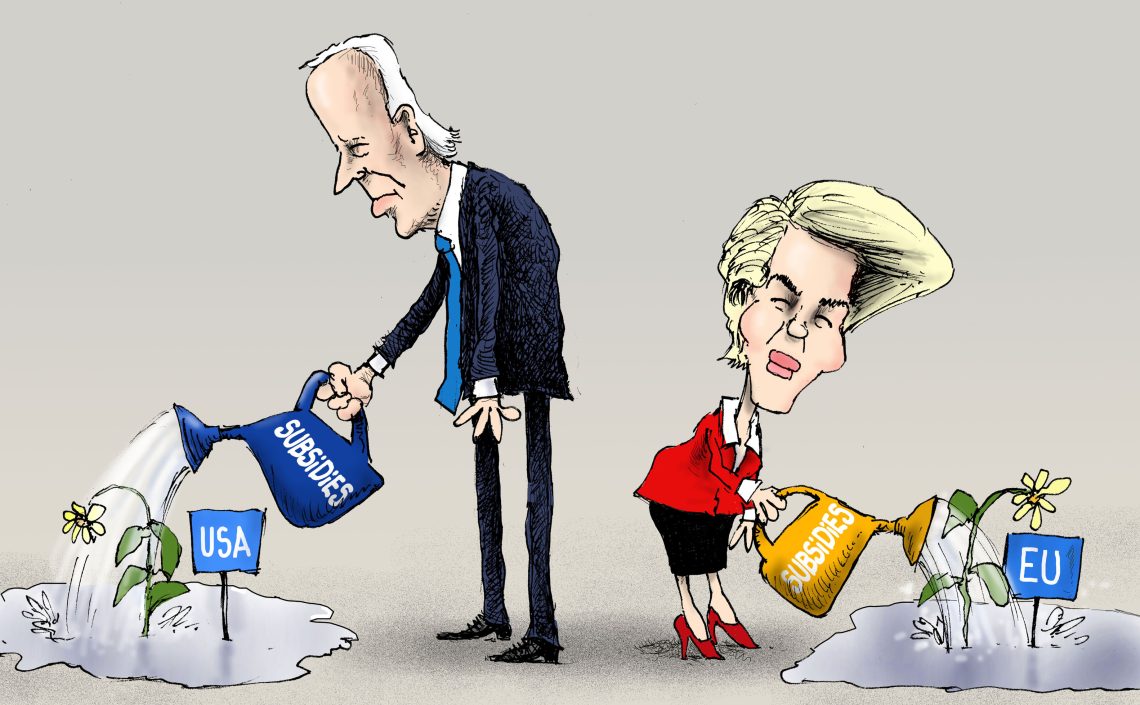Goodbye free trade!
The EU’s answer to the United States’ most recent subsidy program will harm Europe’s global competitiveness.

President Joe Biden and the United States Congress recently passed the Inflation Reduction Act (IRA), a massive subsidy program designed to help reduce the social consequences of inflation and promote investments in “ecologically sustainable” projects. While the IRA should offer some relief, it is de facto state aid for the economy and goes against the spirit of free global trade and the rules of the World Trade Organization. The IRA is worth some $370 billion and is set to be spent over the next decade. This led to uproar and accusations of protectionism in the European Union, which seem justified on the surface. However, while one can agree with the protests, it is debatable whether the EU’s response is the right answer.
The U.S. has always been protectionist, mainly under the guise of job protection. Other major economies are also protectionist, but in different areas. China focuses on state enterprises, investment limitations, currency manipulations and other methods. The EU sets up regulatory barriers under the – at times hypocritical – pretext of consumer protection.
The European Directorate of Competition has certainly been making strange decisions.
In response to the IRA, the European Commission announced the Green Development Industrial Plan (GDIP), a 600 billion euro subsidy program. In terms of percentage of gross domestic product, the GDIP is worth more than twice the IRA. However, it is worth noting that the EU also has different national subsidy schemes approved by the EU authorities on competition.
In 2022, 672 billion euro was approved, with over half in Germany. These subsidies were granted for various reasons, including the costs associated with Covid-19 and the Ukraine crisis.
One of the European Union’s biggest strengths is its commitment to free trade and competition. However, technocrats sometimes argue that free trade is only possible within narrow rules on competition. While it is true that markets need to have their rules, these should be relatively broad. Engaging in a global subsidy race will not help the green development of the EU or its global competitiveness.
The European Directorate of Competition has certainly been making strange decisions. While it is important to avoid cartels, the directorate often focuses too narrowly on specific regions. Some products require economic scale and are part of global competition. In certain cases, mergers could give Europe a global advantage. A prime example of this was the planned acquisition of Alstom by Siemens that was banned by the EU commission. The merger would have given them a strong position on the railway market in Europe, but also allowed them to be globally competitive.
Commissioner Margrethe Vestager stated that: “Millions of passengers across Europe rely every day on modern and safe trains. Siemens and Alstom are both champions in the rail industry. Without sufficient remedies, this merger would have resulted in higher prices for the signaling systems that keep passengers safe and for the next generations of very high-speed trains. The Commission prohibited the merger because the companies were not willing to address our serious competition concerns.”
This explanation is grotesque, since European railways would make or receive offers anyway, not only from the newly merged company but also globally. This type of justification denotes an intention to create “a fortress Europe,” which is against all of the foundational principles of the Union. To be a top performer on the global stage, the EU will have to be more open and avoid such tit-for-tat battles with the U.S.
